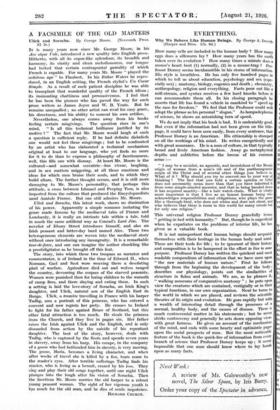A FACSIMILE OF THE OLD MASTERS
IT is many years now since Mr. George Moore, in his Ave algae Vale, introduced a new quality into English prose. Hitherto, with all its organ-like splendour, its breadth and harmony, its clarity and clean melodiousness, our tongue had lacked that certain contrapuntal garrulity of which French is capable. For many years Mr. Moore played the sedulous ape" to Flaubert. In his Esther Waters he repro- duced, in an English setting, the French stylist's Un Coeur Simple. As a result of such patient discipline he was able to transplant that wonderful quality of the French idiom ; its insinuating chattiness and persuasiveness. I feel that he has been the pioneer who has paved the way for such prose writers as James Joyce and W. B. Yeats. But he remains unequalled ; no other artist can rival his easy grace, his directness, and his- ability to conceal his own artifice.
• Nevertheless, one always comes away from his books feeling certain misgivings. The question rises in one's mind, "Is all this technical brilliance justified by its motive ? " The fact that Mr. Moore would laugh at such a question is sufficient reply. If he had definite disbeliefs one would not feel these misgivings ; but to be confronted by an artist who has elaborated a technical mechanism original at least to our language, who yet finds no more for it to do than to express a philosophy of facetiousness, well, this fills one with dismay. At heart Mr. Moore is the cultured—and somewhat eccentric—bon viveur, laughing, and in sex matters sniggering, at all those emotions and ideas for which men bruise their souls, and to which they build altars. The further thought occurs, and it is still more damaging to Mr. Moore's personality, that perhaps this attitude, a cross between Ishmael and Peeping Tom, is also imported from the culture that produced the Encyclopaedists sand Anatole France. But one still admires Mr. Moore.
Ulick and Soracha, this latest work, shows no diminution of his power. Apparently a simple romance imitating the genre made famous by the mediaeval tales of France and Lombardy, it is really an intricate tale within a tale. told in much the same artificial way as Conrad's Lord Jim. The novelist of Ebury Street introduces himself, and also an Irish peasant and latter-day bard named Alec. These two heterogeneous elements are woven into the mediaeval story without once introducing any incongruity. It is a remarkable tour-de-force, and one can imagine the author chuckling like a prestidigitator as he brought off this feat.
The story, into which these two trespass as narrator and commentator, is of Ireland in the time of Edward II., when Norman, Gad and Scot were weaving there a desolating plait of warfare. Agriculture died out and wolves ranged the country, devouring the corpses of the starved peasants. Women were punished then for luring children to the warmth of camp fires, and there slaying and eating them. In such a setting is laid the love-story of Soracha, an Irish King's daughter, and Ulick, natural son of the English Earl de Burgo. Ulick, a trourere travelling in France with his harper Tadhg, sees a portrait of this princess, who has entered a convent and now regrets her piety. He crosses to Ireland to fight for his father against Bruce of Scotland, but this other fatal attraction is too, much. He steals the princess from the Church, and they live in pagan sin. Her father raises the Irish against Ulick and the English, and is only dissuaded from action by the suicide of his repentant daughter. The best of the story, however, deals with Taclhg, who is captured by the Scots and spends seven years in slavery, away from his harp. His escape, in the company of a goose who had befriended him in slavery, is very moving. The goose, Maria, becomes a living character, and when after weeks of travel she is killed by a fox, tears come to the reader's eyes. After terrible sufferings Tadhg finds his master, who is living as a hermit, crazed by his loss. They sing and play their old songs together, until one night Ulick plunges into the lough after his vision of Soracha. Then the facetious Mr. Moore marries the old harper to a robust Young peasant woman. The sight of her vigorous youth is tpo much for the old man, and he dies of senile impotence. RICHARD CHURCH.


































 Previous page
Previous page